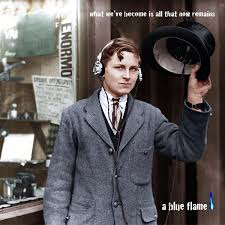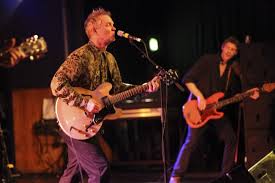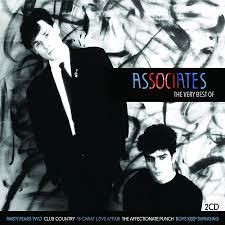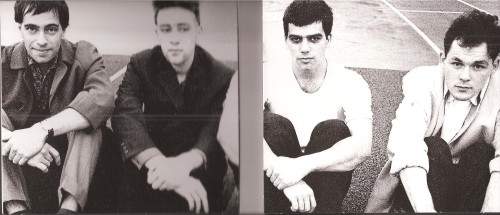Why music and politics are inseparable, and let’s be thankful for that

Don’t worry, the purpose of the above pic will soon become apparent.
I often hear that music and politics should remain separate. I snigger at such a concept; as if they have EVER been separate. Those proponents may as well take the next logical turn in their impotent argument and suggest that drugs and pop have never taken the same fork in the road.
Without some form of statement, music would have become as relevant as the novella, or Spanish mime.
Every turn in society has been reflected in the music of the day, from medieval folk to early jazz and blues, to punk and beyond. In some societies it is one of the few ways of telling how brutal life is.
It is often to the United States that I look to for examples, and I expect with a Trump administration, the ground will become fertile for an upsurge in angry, potent protest songs. Some have already taken the cue, to record the inane but irresistible FDT (the DT is Donald Trump so you can work out what the F stands for).
It has, after all, been a long tradition in the Land of the Free.
Racism and civil rights
In 1939 Billie Holiday recorded Strange Fruit, a song written by Abel Meeropol after he saw a graphic photograph of two black men hanging from a tree. In his lyrics, and in her take on it, Meeropol and Holiday were decrying the lynchings and unfettered racist activity taking place in the American South.
The Civil Rights Movement in the 1960s led to Aretha Franklin demanding Respect and Curtis Mayfield’s epic song of hope, People Get Ready. Bob Dylan wrote one of the greatest anti-war songs of all time, Blowing In The Wind. They would all be heard on civil rights and anti-war songs of the decade.
Beyond the US, songs have been the engine behind the great social movements. Nigerian legend Fela Ransome-Kuti invented Afro Beat as a way to protest the oil company regime, and 1977’s febrile Zombie railed against his country’s military dictators.
In South Africa, Chile, and Brazil music has been at the forefront of the fight against apartheid, military rule and oppression.
Reggae’s fight against injustice, in Jamaica, the UK and around the world requires a boxset in itself, but here is just one example, and it is not a song. At the One Love Peace Concert in 1978, Bob Marley brought the leaders of Jamaica’s two main political parties on to the stage and corralled them into a three-way air-high handshake. “At that moment, everybody was one,” said Edward Seaga the then leader of the opposition JLP.
Without politics there was effectively no such thing as roots reggae in the 1970s. It shaped the genre and gave it its identity. Hard to think now of The Wailers without Get Up Stand Up.
In my adopted New Zealand post-punk outfit Blam Blam Blam exposed the “she’ll be right” head-in-the-sand attitude. There Is No Depression in New Zealand was released in 1981, as protests and police reaction raged, as the offensive Springbok rugby tour exposed deep divisions in Aotearoa. The title virtually explains itself.
I could go on. And on. And I haven’t even touched on punk, These are songs of anger and passion that are heartfelt and, as such, hated by the corporate music industry. It doesn’t sell, they believe. Just give the masses their fill of sex and more sex and they’ll be happy.
It should also be noted that these weren’t movements and artists that embraced politics for the sake of it, to be an upstart, and to get under people’s skin. Politics came to them; if you’re seeing people being bashed or starving, you say something, you stick up for those less lucky than those who can afford a drum set.
Which is not to say that all songs written with a grievance are sublime, but let’s not dwell on the stinkers, at least their heart was in the right place. And no-one is as naïve to believe that it is all of a just cause; alas there is a strong anti-socialist element in country and western music (Okie From Muskogee) and a fascist skinhead scene, although it would be overstating reality to describe this odious sect as a threat beyond a few hundred numbskulls.
Personally, as a teenager, I was taken by a Billy Bragg song. Bragg is often as predictable as the main ingredient in a treacle tart, with his stating-the-bleedin’-obvious go-the-wee-man lyrics, but I love There Is Power In A Union – because there is. The union is the backbone for the downtrodden worker, and Bragg articulately explains why.
“The Union forever defending our rights/ Down with the blackleg, all workers unite/ With our brothers and our sisters from many far off lands/ There is power in a union.”
What a fizzer
Now, pray tell, what, Mr Porky, has Bucks Fizz, those archetypical purveyors of glossy, garish New Romantic-era sugar, have to do with all this.
Land of Make Believe was a No.1 hit in the UK and throughout Europe in 1981 with the band performing a well-choreographed routine on Top of the Pops as it blended in with the Festive Season.
The reality was somewhat different as writer Peter Sinfield later revealed it was an attack on Thatcher’s Britain and the burgeoning, callous neoliberal politics of the time.
“Something nasty in your garden’s waiting/ Patiently, till it can have your heart
Try to go but it won’t let you/ Don’t you know it’s out to get you running
Keep on running/ They’re running after you babe.”
Dissecting this particular verse I can imagine the garden being the green and pleasant land, England’s garden, and that something nasty is all sorts of horrendous policies that subsequently destroyed communities across the country.
So, a four-pieced remembered primarily for a Eurovision act that involved the skirts of the two female singers being thrown away, were in fact a weapon of insubordination. Fancy that.
 frighteningly surreal ability to move one step forward each time. It’s reminiscent of many of his post-Tin Machine albums: beguiling and intriguing, caustically prescient; it pushes the envelope once more.
frighteningly surreal ability to move one step forward each time. It’s reminiscent of many of his post-Tin Machine albums: beguiling and intriguing, caustically prescient; it pushes the envelope once more.
 This self-released album comes in the midst of a British Conservative government intent on pursuing class war, and follows the defeat for the separatists in the Scottish independence referendum (at least in the short-term).
This self-released album comes in the midst of a British Conservative government intent on pursuing class war, and follows the defeat for the separatists in the Scottish independence referendum (at least in the short-term).

 It has lush 60s melodies that remind me of Bill Pritchard, another doyen of English sensibilities, who may not be a name that immediately springs to mind, but he is relatively well-known in Belgium. Which is more impressive than you might think because there’s two of them.
It has lush 60s melodies that remind me of Bill Pritchard, another doyen of English sensibilities, who may not be a name that immediately springs to mind, but he is relatively well-known in Belgium. Which is more impressive than you might think because there’s two of them.








